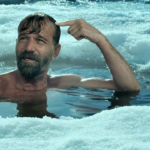Today’s entry may seem a little out there but follow my lead and let’s see where this conversation can take us.
Georgia 1982. It’s a friday afternoon and Angela Cavallo, a middle-aged mom hears a crash out front and runs out to find here teenager Tony pinned under his 64’ Chevy Impala! The jack has slipped and he’s lying unconscious under the car. What do you do? Well she quickly grabbed the car, lifted it and held it for several minutes before neighbors appeared at the scene to put the jack back under the car and pull the boy to safety.
1988 on the TV set of Magnum P.I. a helicopter careens out of control and crashes in a shallow ditch filled with water. The pilot, Steve Klux, was trapped under the 1500 pound helicopter. Without thinking Warren “Tiny” Everal ran to the chopper and lifted it off his friend allowing him to escape.
Hiking in the Sierra Nevadas Amy Racina slips and falls 60 feet off a cliff. Her face smashed and both legs broken, she drags herself with her arms for 4 days and nights until she reaches help.
We have all heard similar stories at one time or another of these superhuman feats and thankfully we don’t need to lift a car or drag our broken body for days before getting help very often if ever. These events occur because of what’s been coined as “hysterical strength”.
During what’s usually a life threatening situation there are sudden biological changes that can take place in our bodies. Sometimes when we’re frightened chemicals like adrenaline are released and rushed to the heart and lungs bringing more oxygen to the muscles to increase strength and heighten awareness and endorphins are released so we perceive less pain.
The problem is that we know very little about how and why this happens. Science can’t really conduct studies because these events usually require putting someone in a life or death situation. But the fact is that the power to do these is inside everyone of us. “Clearly, we have it in us,” says Robert Girandola, an associate professor of kinesiology at the University of Southern California. “It’s not some supernatural force that’s causing that strength.” What are our actual limits? I suggest most of our limits are self imposed by our way of thinking. There’s a great scene in the movie Facing the Giants where the coach asks a player to carry another player on his back for 50 yards. He gets the player to commit to giving his very best. Then he blindfolds the player before he starts the 50 yard “death crawl”. The coach continues to encourage the player and insist he not quit but give his absolute best. When the player finally collapses he finds he is in the endzone and has gone 100 yards. The Death Crawl scene from Facing the Giants
If it is indeed in all of us, what can we do to tap into it? Again I’m not suggesting that we need to lift a car, but what about pushing ourselves to do more? How hard do we really try everyday? How uncomfortable are we willing to get? Are our goals big enough to make us reach? Studies have shown that even elite athletes performing at their peak are only using about 80% of their full capabilities. The average person uses even less. Maybe 50-60%. So do we really need to stop when our brain tells us to? Or could we push ourselves further and reach new pinnacles of growth and understanding about ourselves? We may never have to lift a car, but we can all reach inside ourselves and find hidden untapped strength to do even more!
Points to consider:
How much are you not doing that you could do?
What personal boundaries could you break if you pushed yourself to uncomfortable levels?
How much more are you capable of if you ignore the brain’s comfort centers telling you to stop?
Visualization will never compensate for work undone. You cannot visualize lies. All the strategies I employ to answer the simple questions and win the mind game are only effective because I put in work. It’s a lot more than mind over matter. It takes relentless self-discipline to schedule suffering into your day, every day, but if you do, you’ll find that at the other end of that suffering is a whole other life just waiting for you.” — David Goggins
“No matter what you or I achieve, in sports, business, or life, we can’t be satisfied. Life is too dynamic a game. We’re either getting better or we’re getting worse. Yes, we need to celebrate our victories. There’s power in a victory that’s transformative, but after our celebration, we should dial it down, dream up new training regimens, new goals, and start at zero the very next day.” — David Goggins




